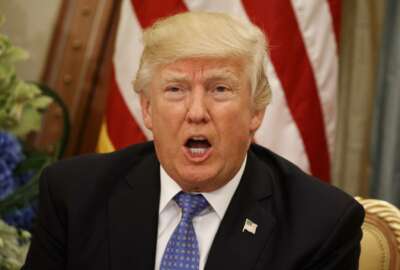
No easy way to measure federal employee compensation, CBO says
Senators sent the Congressional Budget Office a series of questions related to its recent study comparing federal employee compensation to the private sector. But...
There’s no easy to way to calculate just how much government spends on federal employee compensation, and there’s no simple solution if lawmakers want to find ways to close compensation gaps between the public and private sector.
That’s the general message the Congressional Budget Office recently sent in a series of responses to the Senate Budget Committee’s questions for the record following a May hearing on “ways to run the government for less.” During that hearing, some senators focused on CBO’s latest study comparing federal employee compensation to the private sector.
CBO found a 17 percent compensation disparity between federal employees and their counterparts in the private sector, according to its April 2017 report. Moving the federal workforce to a defined contribution plan may partly close the gap between the public and private sectors, though the government wouldn’t see the savings immediately, CBO Director Keith Hall told the Senate committee back in May.
But CBO’s recent responses emphasize: its report on federal employee compensation has plenty of nuances, exceptions and caveats, and there’s little the agency can do to provide more clarity for Congress on its results.
Budget Committee Chairman Mike Enzi (R-Wyo.) and Sen. Chris Van Hollen (D-Md.) each asked CBO whether changing the scoring methodology would alter CBO’s findings, or whether having all federal employees contribute to their pension plans at a higher rate would close the compensation gap between public and private sector workers.
Federal employees hired after 2013 have a higher pension contribution rate of 4.4 percent, compared to their predecessors.
CBO’s report, which measured compensation rates for federal and private sector employees between 2011 and 2015, does not account for those higher contribution rates, because workers hired after 2012 hadn’t yet accumulated the five years of federal service required to receive a defined benefit pension.
If all federal workers had been subject to a 4.4 percent contribution rate, CBO estimates government compensation costs would have fallen by about 2 percent. Therefore, government compensation rates would be 15 percent higher than those in the private sector.
But this estimate is shaky at best, CBO said.
“If federal workers had been subject to the higher contribution rate, some of them might have left federal employment, which might have increased or decreased total compensation on average,” CBO said. “Most of those workers would probably have left earlier because the higher contributions would have made federal employment less attractive when compared with non-federal jobs, retirement or other alternatives. Other federal employees might have extended service because the higher contributions would make an earlier retirement harder to afford.”
CBO looked at compensation discrepancies based on educational attainment in its April report.
In total, federal employees with a high school diploma or less earn on average 53 percent more than their counterparts in the private sector, while federal workers with a bachelor’s degree received 21 percent more in compensation.
In contrast, total compensation costs for employees with a professional degree or doctorate were 18 percent lower than workers in the private sector, CBO said.
Those numbers would also drop by 2 percent if all employees in CBO’s recent study were subject to 4.4 percent contribution rates.
The most recent report re-fueled a familiar debate among members of Congress and some federal employee groups: whether CBO’s latest findings reemphasize past arguments that federal employees are over-compensated and should pave the way for changes to the civil service system — or whether the comparison study reinforces government’s struggles to recruit and retain top talent in mission-critical areas.
The president’s fiscal 2018 budget request includes four major changes to federal retirement, which ultimately asks federal employees to contribute more toward their pensions. Federal financial experts say these proposals would have significant impacts on current and future federal employees and retirees.
Copyright © 2025 Federal News Network. All rights reserved. This website is not intended for users located within the European Economic Area.
Nicole Ogrysko is a reporter for Federal News Network focusing on the federal workforce and federal pay and benefits.
Follow @nogryskoWFED
Related Stories

Gov’t spends 17 percent more on feds’ compensation than private sector, CBO says




